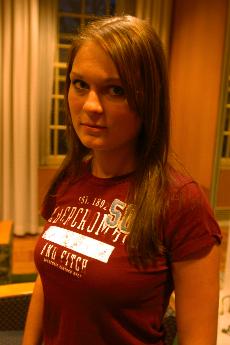Foreign-born UI students embrace differing cultures

Kate Starostin, junior in LAS, moved to the US from Russia 10 years ago. Roxana Ryan
October 12, 2006
As she walks across the Quad, Kate Starostin feels at home at the University. Although she has lived in the United States for less than 10 years, she feels she is surrounded by an “incredibly diverse community” on campus.
A native of Russia, Starostin, junior in LAS, said that attending the University has helped her become more accepting and has taught her to embrace the variety of people in America.
Although foreign-born students often find it difficult to adjust to life in a different country, for Starostin and many others, living in the U.S. has given them many opportunities.
“It’s so different than high school,” she said. “No one is separating themselves from people who look different than themselves. U of I is promoting diversity, rather than hiding it. Look at all the clubs and the roles of the multicultural advocates.”
According to the University Web site, the University has 41,938 students, over 1,000 registered organizations and four cultural houses: African-American, Asian-American, La Casa Cultural Latina and Native American.
Get The Daily Illini in your inbox!
“There weren’t many opportunities in Russia compared to America,” Starostin said. “You learn to appreciate something when you don’t have it. It makes me incredibly thankful to live here.
“For example, there are no hospitals that would accept a student volunteer in Russia. In addition, American universities and schools in general have a lot of clubs and activities which Russia does not. U of I does a great job in giving us all of those opportunities.”
But life is not always so diverse or accepting for first generation Americans.
“When I first moved to the U.S. from China, I definitely felt like I didn’t belong,” Sarah Zhong, senior in LAS, said.
“I didn’t speak the language and knew nothing about American culture. It definitely takes a lot of adapting and learning to fit in. I think my middle school years were the hardest because like any other teenager, I had to trudge through the awkward phase, but unlike them, I also had to deal with cultural incongruence and being different in a predominantly white society,” she added.
Upon her family’s arrival to Chicago in August of 1997, Starostin said that her accent and lack of the ability to speak like others kept her segregated.
But the strain endured by immigrants is worth it in opportunities and freedom available in the U.S., Starostin said.
Zhong said she found a balance between being Chinese and being American.
“Initially, I was in a constant struggle to balance my new way of life with my native culture,” Zhong said. “As I got older, I’ve developed a more mature sense of who I am because of this acculturation. Being American does not erase my Chinese heritage. As a result, I am flexible with my behavior and very adaptable depending on the environmental context. This university has helped form that.”
Both legal citizens of the U.S. and college students, Starostin and Zhong said they feel that they are not discriminated against.
“I definitely don’t feel like an outcast in college because so many people come from different backgrounds, and lots of them are bicultural like me,” Zhong said. “I want to stand out and discover my own uniqueness. U of I is a very diverse university and has contributed greatly to my growth as an individual.”
For these two students, and others who have been able to acclimate to a different culture, aspirations for the future in America are endless.
“I definitely do see myself becoming successful and getting what I want if I put my mind and effort into it,” Starostin said.
“I want to go to medical school to become a doctor. I could never have been able to do that in Russia,” she added.






